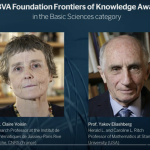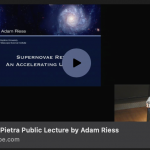Simons Collaboration the Non-Perturbative Bootstrap: November 8-10, 2021
The Simons Center will be hosting the Simons Collaboration: the Non-Perturbative Bootstrap. For more information about this event please visit: http://bootstrapcollaboration.com.
Remote Workshop: Ending Inflation and the Hot Big Bang: November 19, 2021
Organized by: Peter Adshead (University of Illinois at Urbana-Champaign), Jonathan Heckman (University of Pennsylvania), Marilena Loverde (YITP), Patrick Meade (CN Yang Institute for Theoretical Physics), Scott Watson (Syracuse University) This workshop is aimed at filling the gap in our cosmic history – from the end of inflation to the beginning of big bang nucleosynthesis. The … Read more
Virtual Conference Higgs 2021: October 18-22, 2021
For more information about this event please visit: https://indico.cern.ch/event/1030068/
Confronting Large N, Holography, Integrability and Stringy Models with the Real World: February 14 – April 22, 2022
Organized by: Sergei Dubovsky (NYU), Zohar Komargodski (SCGP), Erich Poppitz (University of Toronto), Jacob Sonnenshein (Tel Aviv), Mithat Unsal (North Carolina State University) Since the introduction of QCD as the theory of gluons and quarks quite a lot of methods and toy models have been invoked to seek control on the theory. In particular: considering … Read more
Simons Center YouTube – Della Pietra Lecture Collection
The Simons Center’s popular science lecture series: “Della Pietra lecture series” are now available as a special collection on the Center’s YouTube channel. You can find it HERE: https://www.youtube.com/channel/UC6pOFUNZzTMxqFKaRR53WvQ
Flexibility and rigidity in dynamical systems: March 7-11, 2022
Mini-courses by: François LedrappierKathryn MannRalf Spatzier Research talks by: Lei ChenBassam FayadDavid FisherAndrey GogolevSebastian Hurtado-SalazarAdam KanigowskiTamara KucherenkoThang NguyenRafael PotrieFederico Rodriguez HertzDennis SullivanKurt VinhageAmie Wilkinson This workshop was partially supported by NSF grant DMS-2154392
Geometry, Topology, and Symmetry in Soft and Living Matter: May 9-13 2022
Organized by: Oleg Gang (Chem. Eng. and APAM, Columbia University & CFN, Brookhaven National Lab), Miranda Holmes-Cerfon (Courant Institute, NYU), Karen Kasza (Mech. Eng., Columbia University), Alexei Tkachenko (CFN, Brookhaven National Lab) Soft Condensed Matter Physics is a rapidly changing field that interfaces with multiple disciplines, such as Chemistry, Biology, Nanomaterials, and even Social Sciences. … Read more
Dynamics of SCFTs and Special Functions
Organized by: Shlomo Sergei Razamat and Masahito Yamazaki Recent years have seen significant progress in understanding the dynamics of supersymmetric quantum field theories in various space-time dimensions. This progress was partly due to the development of various localization techniques leading to exact computations of certain partition functions. Such computations can be expressed in terms of … Read more
Simons Summer Workshop: Strings and Geometry July 12 – August 6, 2021
If you would like to participate via zoom please email contact@scgp.stonybrook.edu. Scientific organizer: Cumrun Vafa (Harvard)Local organizer: Martin Rocek (CN Yang Institute for Theoretical Physics) This Workshop is the thirteenth conducted by the Simons Center for Geometry and Physics at Stony Brook and the eighteenth in the series Simons Summer Workshops. This year’s summer workshop … Read more
Small Scale Dynamics in Fluid Motion: June 13-24, 2022
Organized by: Theodore D. Drivas (Stony Brook University), Tarek M. Elgindi (Duke University), Dennis Sullivan (Stony Brook University – Math) Turbulent flows are ubiquitous in the world around us; from trailing airplane wakes to swirling cream in our morning coffee. Despite its prevalence, basic mathematical questions about this complex non-linear phenomenon persist. The purpose of … Read more
















